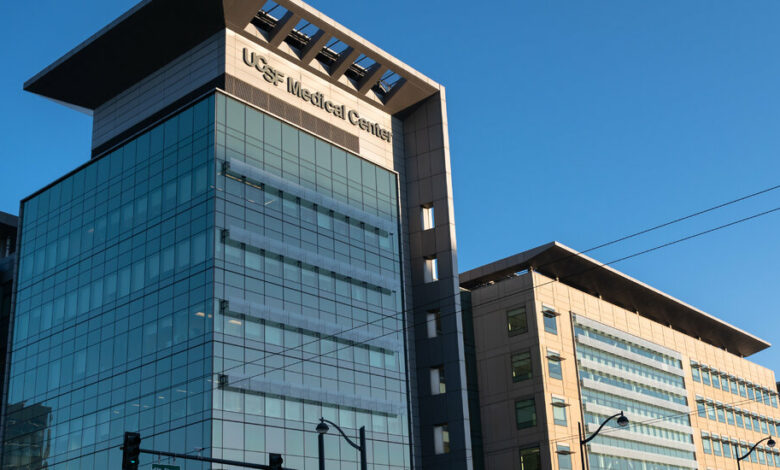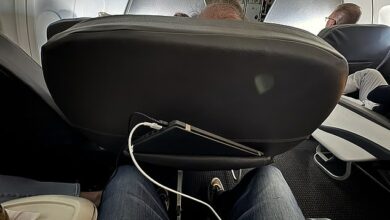In San Francisco, Doctors Argue About ‘Do No Harm’ When It Comes to War Protests

It looked like any other pro-Palestinian encampment on a college campus in the United States. The tents, the flags, the banners calling for a ceasefire in the war between Israel and Hamas.
But this was at the University of California, San Francisco, one of the nation’s leading medical schools and teaching hospitals. The protesters were medical students and physicians. And the chants of “intifada, intifada, long live the intifada!” could be heard from patients in their hospital rooms at the UCSF Medical Center.
The war between Israel and Hamas has frayed social ties around the world, undermining family gatherings and classrooms. But rarely has it torn apart a medical community as much as at UCSF, where a faculty known for celebrating diversity has found itself mired in gossip and mistrust.
The university and the medical center are uniquely intertwined; both are overseen by the same government and are recognized locally as a single, premier institution. Unlike other University of California campuses, UCSF has no students and focuses solely on the health sciences. And for decades, it has built a national reputation for caring for a wide range of patients in the city, from those addicted to fentanyl on the streets to tech billionaires seeking world-class services.
But many say the spirit of camaraderie and inclusion has disappeared since the Hamas-led attack on Israel on October 7. Doctors there have argued about whether it is appropriate to openly express feelings about the war within the healing confines of a hospital. In interviews, several Jewish doctors said they had taken an oath to “do no harm,” and that meant keeping politics separate from the care of their patients.
But some doctors said they interpreted “do no harm” differently, feeling a moral obligation to speak out against the killing of doctors and patients in Gaza, where Israeli strikes have hit hospitals. And they said it was important for UCSF as a medical community to take a stand against the war and call for a ceasefire.
In recent months, doctors, medical students and patients have filed hundreds of complaints with the university’s management. Some have cited cases of anti-Semitism on campus. Others have said they were unfairly silenced when they tried to express pro-Palestinian views.
Jonathan Terdiman, a Jewish gastroenterologist, said behavior that might be tolerated on a college campus — such as the “intifada” chant — comes across differently in a hospital.
“People come here for chemotherapy. They have serious illnesses,” Dr. Terdiman said. “When that cry goes up and is heard in the patient care rooms, which it clearly was, that is a violation of our professional obligations as health care providers.”
Some Jewish doctors said they rushed into side rooms when they saw fervent Israel critics approaching. Others said they have tried to keep their Jewish identity secret. Matthew Smith, a doctoral student in biophysics who is Jewish and wears a skullcap, said he was told by a lab technician that Israel deserved what happened on Oct. 7, and by another student that “Jews control the banks.”
“It honestly baffles me,” says Gil Rabinovici, an Israeli neurologist who directs the Alzheimer’s Research Center at UCSF. “There’s a lot of intimidation going on to try to silence the Jewish voice and the Zionist voices.”
Jess Ghannam also said he can’t believe what UCSF has become, given its well-known history as a place of diversity.
He has worked at UCSF for 30 years and specializes in chronic illnesses, including post-traumatic stress disorder. His parents are Palestinian, and he joined the protests at the encampment and wore a watermelon pin, a symbol of solidarity with the Palestinians.
Patients have thanked him for wearing the pin, he said, because it recognized their horror at the destruction in Gaza. But he said that while he has worn the pin freely, some of his colleagues have been instructed by their supervisors to remove their pins and kaffiyeh.
UCSF has a dress code that prohibits political symbols in patient care, but Dr. Ghannam said staff members have worn pins in support of abortion rights, Black Lives Matter and the LGBTQ community for years without repercussions.
“It has become extremely difficult and painful to walk into buildings at UCSF now,” said Dr. Ghannam. “There is fear and a sense of intimidation.”
Some Jewish doctors said they felt the expressions of support for Palestinians were inappropriate to wear while treating patients. They said some Jewish patients at a fertility clinic were turned away when they asked to remove the symbols.
“I would not wear an Israeli flag pin to a patient meeting,” Dr. Terdiman said. “Absolutely not.”
Dr. Ghannam said he has ordered some of his fellow protesters to remove signs he said were inappropriate, such as a sign at the camp that read “UCSF Kills Doctors,” a reference to protesters’ belief that university investments supported the war. in Gaza.
But he said he had no problem with the “intifada” cry, which pro-Palestinian activists say symbolizes resistance to Israel in Gaza but many Jews see as a call for genocide against their people.
“People who shout that they don’t feel safe sometimes confuse it with feeling uncomfortable,” he said.
In December, a task force of hospital doctors focused on anti-racism discussed via email whether to issue a statement calling for a ceasefire.
Avromi Kanal, a hospital doctor and assistant professor of medicine, responded that while he was “horrified by every innocent death,” he feared a ceasefire would empower Hamas and encourage kidnapping for ransom.
Dr. Kanal has dozens of relatives living in Israel, including one who hid from Hamas for hours at a music festival on the day of the attack and another who works in the forensics department and had to identify the bodies of dead children. His grandfather survived the Auschwitz concentration camp, with his forearm branded by the Nazis.
Shortly after he sent the email questioning a ceasefire resolution, Dr. Kanal discovered that someone had forwarded the email to another UCSF physician, Rupa Marya, who practices internal medicine and said she focuses on how history and power affect health. She criticized his email on X multiple times over several months without identifying him by name.
But later, in a Substack post, Dr. Marya referred to him by name, calling his email a “spread of anti-Arab hate” that prompted doctors of South Asian and North African descent to “say they don’t feel safe in his presence.”
Dr. Kanal said he was shocked that a colleague he had never spoken to had criticized him so openly. He spoke to university leaders several times, but he said they took no action. He then filed a complaint with the school’s Office for the Prevention of Harassment and Discrimination, which responded that Dr. Marya’s speech was protected and closed the complaint.
“It is not my colleague’s words that make me feel unwelcome and frankly unsafe here at work,” Dr. Kanal said. “It is my leadership’s continued unwillingness to clearly address them and ensure my inclusion in this broader community here at UCSF.”
The university did respond to another post by Dr. Marya. In January, she said on X that “the presence of Zionism in American medicine must be examined as a structural barrier to health equity,” while sharing someone else’s post about being “terrified” of “Palestinian, Arab, Muslim, South Asian, and Black patients” being treated by Zionist doctors and nurses.
The university said, without Dr. Marya or quoting her post, in a statement that the idea that Zionist doctors pose a threat to their patients was both anti-Semitic and “a tired and well-known racist conspiracy theory.”
In a written response, Dr. Marya said UCSF’s statement addressing her post was “a dishonest attempt to silence perspectives they don’t like” and that in her 22 years on the job she has never experienced “the kind of repression” she has been using since October 7 .
She said she took Dr. Kanal to task because his email marked the first time she “heard a doctor make an argument for continuing to kill innocent people.”
“It shocked me to see this and it violates a fundamental ethical cornerstone of our profession to do no harm,” she wrote.
If there is one thing the doctors agree on, it is that university administrators have done too little to reduce tensions and address complaints.
A spokeswoman for UCSF, Kristen Bole, said the university and medical center work hard to ensure a healing environment for its patients and respect the freedom of expression of its employees. She said Sam Hawgood, the chancellor who oversees both the school and the hospital, has met with faculty to hear their concerns and has made public statements repeatedly denouncing bigotry.
She declined to discuss the details of how UCSF has addressed certain complaints. Mr. Hawgood declined an interview request.
Rick Sheinfield, a Jewish lawyer who has treated doctors at UCSF for 30 years, said he filed a complaint with UCSF about Dr. Marya’s posts in January. In April, he was told his case had been closed with no action taken.
He said he and his family have received excellent medical care there — from heart surgery to the birth of his two children. He’s not sure if he’ll remain a patient, but said he knows one thing for sure: If he were to seek medical care in San Francisco now, he’d cross UCSF off his list.
It wasn’t so much the messages from one doctor that bothered him, he said, but the indifference of the rest of the community.
“I don’t think they would tolerate this if it were medical conspiracy theories saying such hateful things about other groups,” he said. “But they tolerate this.”




